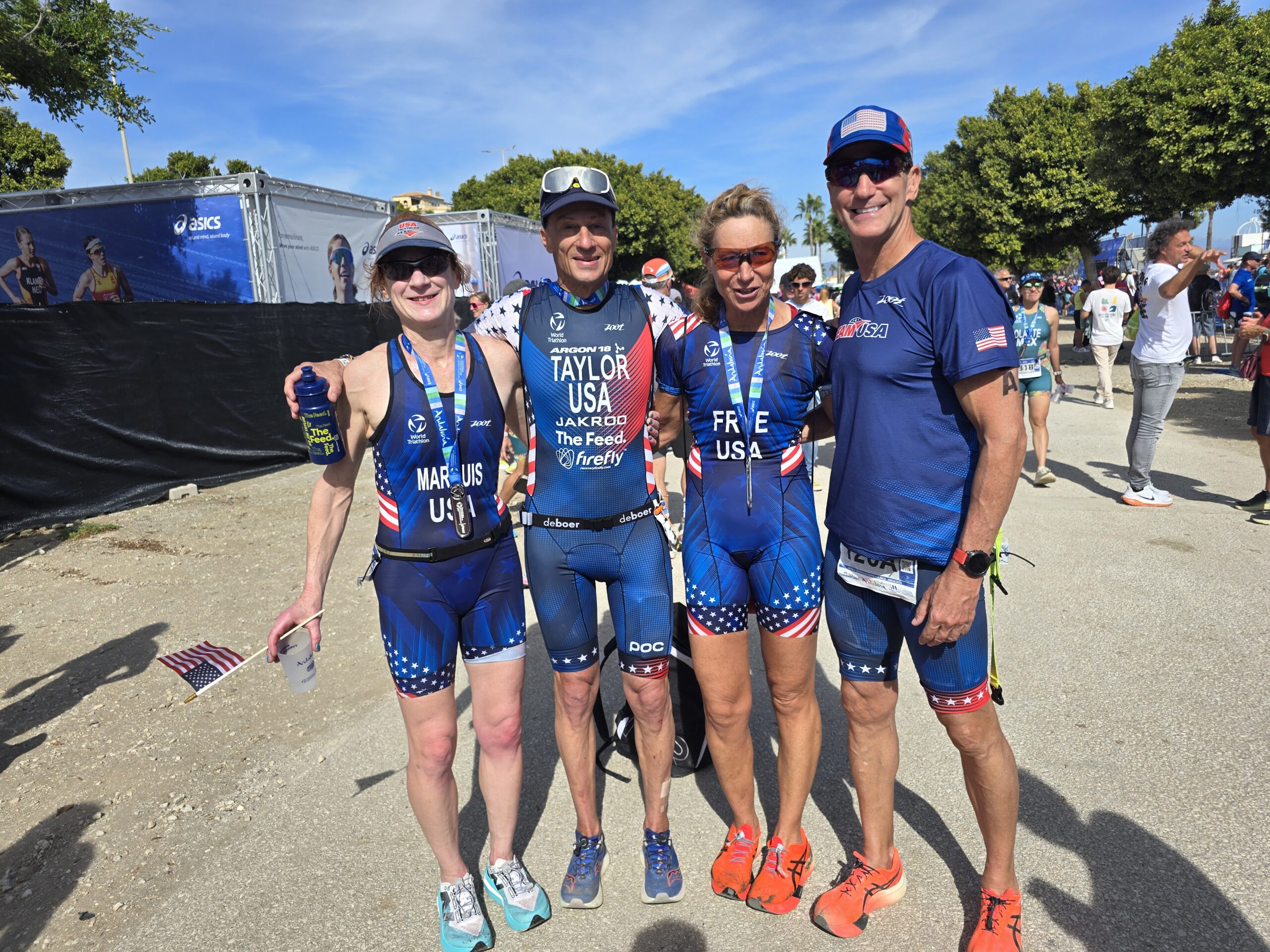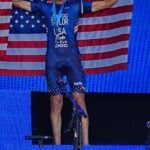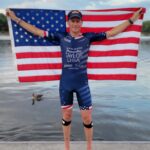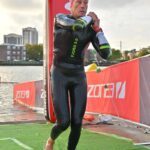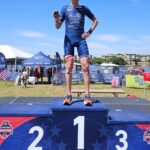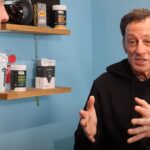I was not a happy camper after my disappointing performance in the Sprint event at the World Triathlon Championships last week in Spain ![]() (to learn more). As I noted in my last post, I’m not just happy to be at the World Championships and participate; rather, I do triathlon to compete and see how I stack up against the best. Though, as the standard investment disclaimer states, “Past performance isn’t a guarantee of future performance.”
(to learn more). As I noted in my last post, I’m not just happy to be at the World Championships and participate; rather, I do triathlon to compete and see how I stack up against the best. Though, as the standard investment disclaimer states, “Past performance isn’t a guarantee of future performance.”
I was discouraged, confused, and frustrated by my performance in the Sprint because I felt generally good physically and mentally leading up to the race. But it wouldn’t look very good, and I wouldn’t be a very good role model, if a mental coach threw in the towel psychologically and emotionally. So, I used every tool in my mental toolkit (e.g., “power words,” mental imagery, and focusing on the process) to get myself ready for the Mixed-relay (MR) this past Sunday.
good role model, if a mental coach threw in the towel psychologically and emotionally. So, I used every tool in my mental toolkit (e.g., “power words,” mental imagery, and focusing on the process) to get myself ready for the Mixed-relay (MR) this past Sunday.
I was a bit more optimistic about the MR for several reasons: I was a member of the bronze-medal-winning mixed-relay team from  Hamburg in 2023, am the current USAT National Champion in the MR and second in the 2024 Super-sprint (the same distance as the MR), and, over the last several years, I have found that the shorter the race, the faster I am. Those experiences were the anchor of my confidence, but there was definitely some drift away from that belief because of my Sprint result earlier in the week and the fact that I knew something was off with me physically.
Hamburg in 2023, am the current USAT National Champion in the MR and second in the 2024 Super-sprint (the same distance as the MR), and, over the last several years, I have found that the shorter the race, the faster I am. Those experiences were the anchor of my confidence, but there was definitely some drift away from that belief because of my Sprint result earlier in the week and the fact that I knew something was off with me physically.
My confidence was also buoyed by my three teammates who are both seasoned veterans of age-group triathlon, and fit and fast. My two female teammates, Lisa Marquis and Cathy Frye, were on my podium- earning World Championship MR team from last year. Unfortunately, my male teammate from last year, KC Bailey, was injured, so couldn’t come to Spain. His replacement, though, was John Myers, newly aged up and a very strong swimmer and cyclist (and no slouch on the run either); I love racing with “youngsters!”
earning World Championship MR team from last year. Unfortunately, my male teammate from last year, KC Bailey, was injured, so couldn’t come to Spain. His replacement, though, was John Myers, newly aged up and a very strong swimmer and cyclist (and no slouch on the run either); I love racing with “youngsters!”
I did my usual preparations leading up to the race and, though I wasn’t exactly brimming with excitement and positivity, I was at least giving myself a chance to redeem myself. Also, a big motivator for me  was that the MR was my last race of the season, and I wanted to end what has been a very successful campaign on a high note. Plus, the MR is my favorite event in triathlon because it is a team effort, and I didn’t want to let my teammates down. I was clearly not at 100% on race day, but I was darned committed to giving 100% of whatever I had that day.
was that the MR was my last race of the season, and I wanted to end what has been a very successful campaign on a high note. Plus, the MR is my favorite event in triathlon because it is a team effort, and I didn’t want to let my teammates down. I was clearly not at 100% on race day, but I was darned committed to giving 100% of whatever I had that day.
Redemption (at least partial)
As is usually the case with me, as I got closer to the race, the more I was able to marshal my psychological and emotional resources. I became more confident, felt less nervous, and got more excited about the race. By the time I was waiting for Cathy’s “tag” as the #3 member of our team, I was ready to suffer for the next 25-30 minutes.
became more confident, felt less nervous, and got more excited about the race. By the time I was waiting for Cathy’s “tag” as the #3 member of our team, I was ready to suffer for the next 25-30 minutes.
Swim. My expectations are always low for the swim. I just try to keep  my stroke rate high and push myself from start to finish. The conditions were ideal, and I felt fine, but I still came out of the water 45-seconds behind the slowest swimmer in the top 5.
my stroke rate high and push myself from start to finish. The conditions were ideal, and I felt fine, but I still came out of the water 45-seconds behind the slowest swimmer in the top 5.
T1. My big focus in the MR is to literally sprint as fast as I can from the water exit to my bike. I had a decent T1, but once again, I ran past my bike and had to double back. Given that I did the same thing in the Sprint, and I have never done this before, I attribute this preventable miscue to a lack of awareness and focus from just not being right this week.
my bike and had to double back. Given that I did the same thing in the Sprint, and I have never done this before, I attribute this preventable miscue to a lack of awareness and focus from just not being right this week.
Bike. In the MR that my team won at the 2024 USAT Multisport Nationals in Omaha, I decided to try using flat pedals with straps ![]() because a number of age-group triathletes I respect recommended them. They worked well in Omaha where I felt I had a solid platform, and it felt great to run out of and into transition in running shoes. The MR in Spain was another story. Using the same pedals, I couldn’t quite get my feet comfortable on the platforms, my feet moved around a lot when I pedaled, and, when I began pedaling at the end of turns, my inside pedal hit the road three times and, though I didn’t crash, they scared the heck out of me. Were platform pedals and running shoes faster through transition? For sure. Were they a liability and slower on the actual bike ride? I’m not sure, but I’m having second thoughts about using them in future MRs. Plus, a visual survey of the transition area indicated that about 99% of the MR competitors used cycling shoes for the event.
because a number of age-group triathletes I respect recommended them. They worked well in Omaha where I felt I had a solid platform, and it felt great to run out of and into transition in running shoes. The MR in Spain was another story. Using the same pedals, I couldn’t quite get my feet comfortable on the platforms, my feet moved around a lot when I pedaled, and, when I began pedaling at the end of turns, my inside pedal hit the road three times and, though I didn’t crash, they scared the heck out of me. Were platform pedals and running shoes faster through transition? For sure. Were they a liability and slower on the actual bike ride? I’m not sure, but I’m having second thoughts about using them in future MRs. Plus, a visual survey of the transition area indicated that about 99% of the MR competitors used cycling shoes for the event.
T2. Because I was already in my running shoes, and I actually focused on finding my bike, my T2 was smooth, fast, and uneventful. And it was the fastest T2 of the day in my age group and only 10 seconds slower than the young guys!
Run. Just like in the Sprint, as soon as I left the transition area, I knew I didn’t have good legs: no fast turnover, no long stride, no pop in my step. I told myself two things. First, I can handle any amount of pain for six minutes. Second, there was no way I was going to let my teammates down. Despite all this, I still had the 6th fastest run split in my age group and I was about 5 seconds per mile faster than last year’s World MR (both on flat courses, so pretty much apples to apples).
pain for six minutes. Second, there was no way I was going to let my teammates down. Despite all this, I still had the 6th fastest run split in my age group and I was about 5 seconds per mile faster than last year’s World MR (both on flat courses, so pretty much apples to apples).
Overall Reflections
With the World Championships in my rearview mirror, I have mixed  feelings about the event. I am certainly pleased with our 5th place finish (out of 32 teams) in the MR. But I wasn’t thrilled about my individual performance in the race. And I was not happy with my Sprint performance at all.
feelings about the event. I am certainly pleased with our 5th place finish (out of 32 teams) in the MR. But I wasn’t thrilled about my individual performance in the race. And I was not happy with my Sprint performance at all.
On the positive side of the trip, it is always an honor to represent my country (that’s why love short-course racing over IMs and T100s!). I especially love our amazing community where, as I did many times last week, I just walked up to people from different countries, and we instantly bonded over our passion for triathlon. And, of course, I’m grateful to be healthy and fit enough to be able to swim, bike, and run.
At the same time, I’m a competitive guy and, right or wrong, I judge my races partially on how I compare to the best in the world. And, this year, that comparison wasn’t incredibly bad, but not what I was hoping for. What gnawed at me was that I didn’t feel that I performed up to my ability, which is my goal every time I race, regardless of the outcome. And I also struggle with the “what ifs” (e.g., “What if I had been able to find a pack to draft,” “what if I had good legs”).
As much as I tried to stay positive and relaxed during race week, I have to admit that I wasn’t in a very good mental space. My mind was filled with what I call RAT thinking (“reluctance/avoidance thinking”). A deep and unconscious part of me didn’t want to be there. I had this feeling slowly creeping up on me since USAT Triathlon Nationals in mid-September. In the month since, that feeling was low-grade, but evident, like having a slight fever that doesn’t knock you down but does take a toll on the body.
Now that my race season is over, I have three questions to answer as I put the 2024 season behind me and look toward 2025. First, what happened at the end of 2024? I don’t have a clear sense of that yet, but my initial and gut reaction is that the race season was long (it started for me in early March at Clash Miami) and my mind and body were just plain tired of the grind.
Second, what do I need to do to improve my swimming and cycling so I can once again contend for medals in my age group at 2025 Nationals and Worlds? I realize that, at my age, improvement is either slow or nonexistent (and, realistically, a more realistic goal is to slow down less than my competitors rather than actually get faster), but I’m not one to accept my age and its inevitable limitations sitting down..
Finally, do I still have the drive to commit so much time, energy, and money to what is always challenging, often unpleasant, and sometimes seems to be just plain trivial? Of the three questions, this is the only one that is easy for me to answer: a definitive yes! Right or wrong, good or bad, my passion for triathlon, the meaning, satisfaction, and joy I gain from it, and the connections I feel with our community are rocket fuel for my mind, body, and soul. And, after a few weeks of recovery, I’m going to be ready to hit the launch button and chart a new, uncertain, and undoubtedly exciting course toward 2025.
Thanks to all for making me a part of the triathlon family, stay healthy, train hard, and see you all in 2025…

